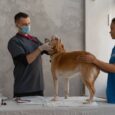Bringing home a new puppy is an exciting time. Proper care and regular check-ups are essential to ensure a healthy, happy life for your furry friend. The first veterinary visit is crucial in laying the foundation for your pup’s well-being. This article will discuss how to prepare for the appointment, outline what to expect, and offer expert tips for a stress-free experience.
Preparing for the First Vet Visit
Gathering important documents
Before your puppy’s initial appointment, gather any important documents related to their medical history. This can include breeder information, adoption or purchase records, and any previous vaccination records. Organizing these documents beforehand will help streamline the process and provide valuable information to the veterinarian.
Preparing your puppy
Help your puppy feel more comfortable by gradually familiarizing them with car rides. Bring a favorite blanket or toy to make the trip feel more secure. This will help reduce anxiety and create positive associations with the journey to the vet clinic.
Scheduling the appointment
Choose a reputable veterinary clinic and schedule an appointment within the first week of bringing your puppy home. Ensure that you choose a time when you’ll be able to monitor your pup after the visit, especially for possible vaccine reactions.
Preparing a list of questions for the vet
Write down any concerns or questions you might have regarding your puppy’s health, feeding, training, and overall care. The veterinarian will be able to address these topics during the appointment to ensure you feel informed and confident in caring for your new pet.
First Vet Visit: Knowing What to Expect
Initial puppy health check
During the first visit, the veterinarian will perform a comprehensive physical examination of your pup. This includes checking for parasites, evaluating dental health, and assessing their weight, coat, and overall condition.
Puppy vaccination schedule discussion
An important aspect to discuss with your veterinarian is the recommended puppy vaccination schedule. They will inform you about the core and non-core vaccinations, as well as the timing and frequency of each. These can help prevent various diseases and protect not only your pet but also other animals and humans.
For example, a visit to a pet vaccination clinic in Carlsbad, CA, will ensure your pup is protected from harmful diseases like rabies, leptospirosis, and canine influenza.
Other preventive care measures
Beyond vaccinations, your veterinarian will recommend other preventive measures to protect your puppy’s health. This can include deworming, flea and tick prevention, and heartworm prevention. Staying consistent with these measures will significantly contribute to overall well-being.
Essential Topics to Discuss with the Veterinarian
Diet and nutrition
Feeding your puppy the appropriate diet is crucial for growth and development. Talk to your veterinarian about recommended food types, portion sizes, and feeding schedules. They will help you make the best choices for your unique pet.
Exercise and socialization
Developing a well-rounded and happy puppy requires adequate exercise and socialization. Discuss the recommended amount of daily physical activity and how to safely introduce your puppy to new situations, environments, and other pets.
Training and behavior
The first few months of your puppy’s life are critical for establishing good habits and manners. Topics to discuss with your veterinarian include housebreaking, obedience training, and crate training. Early attention to these areas will set your pup up for success throughout their life.
Additionally, a puppy vet check in Carlsbad, CA, can offer valuable insight into breed-specific behavioral tendencies and training techniques suited to your pet’s breed.
Grooming and dental care
Proper grooming and dental care are essential for maintaining your puppy’s health. Your veterinarian can provide guidance on optimal brushing techniques, frequency of baths, nail trimming, and routine dental care.
Handling Health Issues and Emergencies
Recognizing common puppy health issues
Being aware of potential health issues common in puppies, such as ear infections, skin allergies, and parasitic infections, will help you address any problems early on. Discuss the symptoms, treatment, and prevention of these conditions with your vet.
A regular dog checkups is essential not only for monitoring your pup’s growth but also for catching any potential health issues before they worsen. As your dog grows, you may consider scheduling dog wellness exams with a trusted veterinarian to ensure continued good health and happiness.
When to contact the vet
Understanding when to seek veterinary care can mean the difference between a quick recovery and a serious health issue. Talk to your vet about common emergency situations, such as ingestion of toxic substances, and determine an appropriate course of action for these events.
Pet insurance and financial planning
Addressing the financial aspects of pet ownership is essential for long-term care. Discuss the benefits of pet insurance with your veterinarian, and learn about budgeting options available for veterinary care.
Conclusion
Preparation and knowledge are crucial for a successful first vet visit. Establishing a strong foundation for your puppy’s health and developing a trusting relationship with your veterinarian will help ensure that your furry friend can thrive for years to come. With diligent care, veterinary support, and a proactive approach to pet parenting, you’ll be well on your way to raising a healthy, happy dog.



